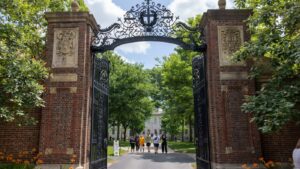Rural Community Colleges Consider Adding Bachelor’s Degrees to Bridge Education Gaps
Muscatine, Iowa—a town nestled along the Mississippi River—sees a growing need for higher education opportunities that meet the needs of its community. Elexiana Oliva, an 18-year-old aspiring police detective, exemplifies the challenges faced by students pursuing higher education in rural areas. While her passion for criminal justice is cultivated at Muscatine Community College, completing a bachelor’s degree requires relocating to a distant university—a journey she intends to make to Texas.
Muscatine Community College students, including Oliva, represent the estimated 13 million people in the U.S. who live beyond a reasonable distance from a four-year university, according to the American Council on Education. This issue is exacerbated by the closure of rural private colleges and the consolidation of public university campuses, leading to reduced higher education options.
“It’s not our fault that we grew up in a place where there’s not a lot of big colleges and big universities,” states Oliva. Her sentiment echoes the concerns of many who see local bachelor’s programs as a potential game-changer for those with limited financial means.
Efforts to Expand Educational Access
Iowa joins a growing number of states contemplating allowing community colleges to offer bachelor’s degrees as a solution to “higher education deserts.” More than half of U.S. states already permit community colleges to confer four-year degrees. Iowa’s legislative body is studying the feasibility of this initiative at its 15 community colleges, with an interim report anticipated soon.
Similar efforts are underway in states like Illinois, where Governor JB Pritzker supports the proposal, citing its potential to make higher education more accessible for working adults in rural areas. A survey from Pritzker’s office revealed that 75% of Illinois community college students would pursue bachelor’s degrees if available on their current campuses.
In Kentucky, lawmakers are considering transforming a technical college into a four-year institution. Meanwhile, Wyoming and Texas have seen community colleges integrate bachelor’s programs, partnering with universities to offer degrees in high-demand fields, such as engineering technology through Texas A&M University-Central Texas.
Challenges and Opportunities
Distance remains a significant barrier for rural students, notes Christy Ponce, president of Temple College. “There’s not a public university option within an hour or more away. And affordability and transportation barriers are huge issues,” she explains. These logistical challenges contribute to the lower educational attainment in rural areas, where only 25% of residents hold bachelor’s degrees, compared to the national average of 33%, per the National Center for Education Statistics.
Community colleges face resistance from traditional four-year institutions, which fear competition for dwindling student numbers amid the “demographic cliff.” This tension is evident in Illinois, where the proposal to allow bachelor’s degrees at community colleges is stalled due to opposition from university leaders.
Addressing Workforce Needs
The push for community college bachelor’s programs is largely driven by workforce demands. Davis Jenkins from the Community College Research Center at Teachers College, Columbia University, emphasizes that these degrees cater to specific economic needs not met by other institutions. “It’s all about serving our workforce needs,” says Iowa state Rep. Taylor Collins, highlighting the local demand for skilled workers who can study without leaving their communities.
Muscatine Community College President Naomi DeWinter envisions significant benefits for working adults seeking advancement opportunities. The college’s existing infrastructure, such as its registered nursing program, already offers students like Mykenah Pothoff a chance to save on tuition and avoid lengthy commutes.
For many students, the ability to complete a bachelor’s degree locally would be transformative, allowing them to remain in their communities while pursuing higher ambitions. As Shiloh Morter, an engineering student at Muscatine Community College, reflects, the rural setting offers unique advantages, from community connections to picturesque landscapes, further underscoring the value of accessible education.
This story about rural higher education and community college bachelor’s degrees was produced by The Hechinger Report, a nonprofit, independent news organization focused on inequality and innovation in education.






